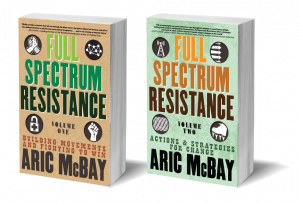We fight because industrial capitalism is a dead end. If the ecological situation is so awful, people often ask me, why don’t we see it in our daily lives? For those of us living in the wealthy industrialized world the answer is simple: we are insulated from ecological destruction by a sea of cheap oil. We are not aware of the obliteration of topsoil because fossil fuels allow the production of cheap synthetic fertilizers and pesticides that (along with the depletion of fossil aquifers) temporarily increase global food production. We are not aware of the eradication of ocean fishes because cheap energy allows huge fishing fleets (with the help of satellites and spotting planes) to locate and catch the few remaining schools of large fish in the ocean. And so on.
We know that nearly everything about our daily material lives depends on cheap petroleum. Producing a calorie of food energy takes about ten calories of oil. The insulating effects of cheap oil are only temporary.
With the most accessible sources of cheap oil already used up, energy corporations have turned to almost inconceivably destructive new methods: natural gas fracking, the tar sands, mountaintop removal. We have reached the point where maintaining industrial civilization literally means blasting, bulldozing, and grinding the land itself into tiny pieces. These methods may delay industrial collapse, but if not stopped they will doom us to runaway global warming and unimaginable catastrophe.
Industrial civilization cannot last forever; the question is whether anything will be left once it is gone. The sooner collapse happens the better for the planet and those who live after. Part of our job as people who care about justice is to try and minimize the strife of that collapse and segue to low-energy, sustainable, egalitarian societies.
That industrial civilization is a dead end, or that industrial capitalism will collapse, doesn’t mean that it will disappear easily. Quite the opposite. Whenever capitalism is on the verge of failure—whenever that Ponzi scheme approaches its limits—the capitalists do whatever they can to prolong it. They will try to shore it up by pillaging the commons that remain, be they physical commons like the ocean or societal commons like social services and health care. They will especially attack unions, the poor, and people of color, as they are doing now. They will resort to wars, which are often good for business. We cannot stand back and hope that the hand of history will shuffle capitalism off the stage without fuss or muss. If we want to avoid a gruesome and prolonged slide into fascism or neo-feudalism, we must fight.


